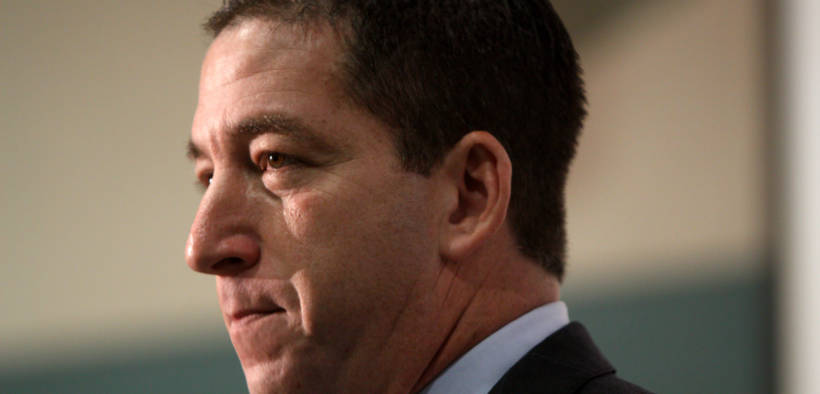Glenn Greenwald Charged With Cyber Crimes By Brazilian Government

“Charging journalists with criminal activity based on interactions with sources sends a chilling message to reporters working on sensitive stories…”
The Brazilian government charged Rio-based journalist Glenn Greenwald with cybercrimes for his reporting on leaked cellphone communications that undermined the credibility of Sergio Moro, President Jair Bolsonaro’s Justice Minister, for his politically-motivated efforts to imprison former Brazilian President Lula da Silva.
“We at The Intercept see this as an attempt to criminalize not only our journalism but also that of the dozens of partners who collaborated with our staff in over 95 stories based on the archives,” The Intercept said in a statement. “There is no democracy without a free press, and defenders of the press everywhere should be deeply concerned about Bolsonaro’s latest authoritarian move.”
Greenwald co-founded The Intercept news outlet after winning a Pulitzer Prize for leading the Guardian’s reporting on Edward Snowden’s government surveillance revelations in 2013. He later opened a Brazil-focused branch of the outlet, The Intercept Brasil, where he lives with his husband, a leftwing Brazilian politician.
Operation Car Wash
The Intercept Brasil’s most well-known reporting, and the source of the charge against Greenwald, involves text messages exchanged between prosecutors and then-Judge Moro concerning charges against former President Lula.
The messages show that prosecutors in the broad-ranging corruption probe, called “Operation Car Wash,” traded inappropriate messages with the supposedly impartial Judge Moro. Prosecutors expressed concern about the quality of evidence against da Silva, and sought to block a journalist from interviewing him out of fear it would help the former president’s Worker’s Party in Brazil’s 2018 presidential election.
Before Moro convicted the former president on corruption charges, Lula was leading the polls as the favored presidential candidate in Brazil’s 2018 election. Lula’s imprisonment allowed Jair Bolsonaro, a far-right politician who has praised Brazil’s former military dictatorship, to gain the lead and win the presidency. Bolsonaro then appointed Moro as justice minister
Greenwald has long warned of the threat Bolsonaro poses to Democratic norms.
“Elections won’t change anything in this country,” Bolsonaro said in 1999. “It will only change on the day that we break out in civil war here and do the job that the military regime didn’t do: killing 30,000. If some innocent people die, that’s fine. In every war, innocent people die.”
Eduardo Bolsonaro, one of the president’s sons, caused an uproar in November after suggesting the return of dictatorship-era repression on leftist opposition. In a more recent scandal, Brazil’s culture minister paraphrased the German Nazi politician and Reich Minister of Propaganda in Nazi Germany, Joseph Goebbels, in a speech last week.
Charges Against Greenwald
Prosecutors are basing their case on alleged conversations that Greenwald had with the hackers in which he advised them on how to cover their tracks. “Prosecutors also say that Mr. Greenwald was communicating with the hackers while they were actively monitoring private chats on Telegram, a messaging app,” reported the New York Times. Greenwald said he “did not give direction” to the hackers,
“There’s nothing in the complaint showing that he helped or guided” the hackers, Thiago Bottino, a legal expert at Fundação Getúlio Vargas University in Rio de Janeiro, told the New York Times. “You can’t punish a journalist for divulging a document that was obtained through criminal means.”
Grayzone editor Max Blumenthal noted the parallels between Greenwald’s charge and the ongoing imprisonment of Julian Assange, which a UN expert described as psychological torture. Blumenthal, who himself was arrested on false charges last year, notes that both cases pose grave threats to the freedom of the press.
Brazil is charging @ggreenwald w/ basically the same thing the US charged Julian Assange for: communicating with & providing instructions to “hackers,” thus “facilitating the commission of a crime.” Seems the US indictment is a blueprint for Bolsonaro’s assault on a journalist.
— Max Blumenthal (@MaxBlumenthal) January 21, 2020
Grayzone journalist Ben Norton notes that Moro recently visited the CIA headquarters and Blumenthal pointed to the US Department of Justice’s involvement with the Lava Jato investigation that Greenwald worked to expose, raising the potential issue of US government complicity with the charge.
Other journalists similarly condemned the Brazilian government’s move as an attack on press freedom.
“Charging journalists with criminal activity based on interactions with sources sends a chilling message to reporters working on sensitive stories at a time when the Brazilian media is increasingly under attack from officials in its own government,” Natalie Southwick of the Committee To Protect Journalists told the New York Times.















